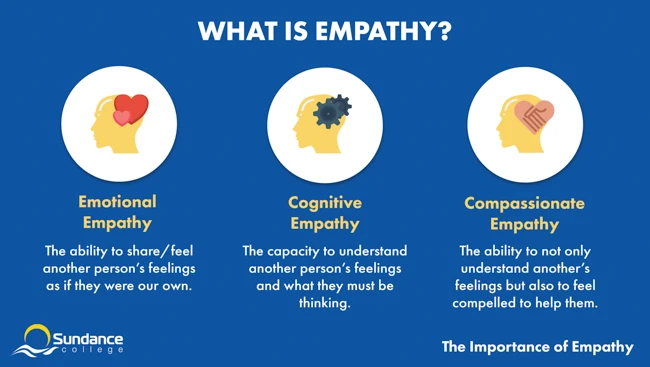Blog / The Importance of Empathy
The Importance of Empathy

Explore our Diploma Programs
- Business, Hospitality, and Legal
- Health and Human Services
- Technology
Table of Contents
Written by Jay D., Sundance College ACHP Instructor
Looking back, I would have to say that it was first brought to my attention in kindergarten. It hung on the wall behind the teacher’s desk, and she asked the class to recite The Golden Rule daily; ‘Do unto others as you would have them do unto you’. It was at this early age when empathy was taught to me, as well as to many others, at least I assume as much.
What Is Empathy?
Empathy is the ability to sense other people’s emotions and is usually coupled with the ability to imagine what one might be thinking or feeling. Having the capacity to feel empathy allows people to ‘walk a mile in another’s shoes’. This is a particularly important skill for those who are seeking a career in health care or working with vulnerable populations.
What Is The Difference Between Sympathy & Empathy?
When you feel sympathy for someone, you identify with the situation that the person finds themselves in. Feeling sympathetic does not necessarily connect you to the person; you can be sympathetic to someone’s situation while being unaware of their feelings or thoughts. For this reason, sympathy rarely compels you into action. Empathy, on the other hand, involves understanding what someone is feeling and actually feeling those feelings yourself.
Dr. Brene Brown, author of The Power of Vulnerability, explains the difference well when she says that sympathy is to see someone in a deep hole, but to remain on higher ground, talking to them from above. In contrast, empathy is feeling with the person; it is climbing into the hole to sit beside them.

Why Is Empathy Important?
Empathy is important in almost every aspect of daily life. It allows us to have compassion for others and relate to friends, loved ones, co-workers, and even strangers.
Empathetic behaviour has been shown to increase cooperation and forgiveness and decrease aggression and judgment, all of which are necessary attributes for healthy personal relationships. Studies even show that relationships lacking in empathy are rarely deemed as fulfilling. More often than not, those relationships fail.
Empathy is often considered a benchmark of emotional intelligence and so is especially important for those who work in the health care field or with vulnerable people. This is where compassionate empathy comes into play. Compassionate empathy is the ability to not only understand another’s feelings but also to feel compelled to help them. Taking this approach to people struggling with addiction or mental illness will assist you greatly in your ability to understand someone’s struggle and provide effective care.
Given its fundamental role in social functioning, it is no surprise that empathy is also associated with increased emotional well-being and better health.
Where Does Empathy Come From?
It was once a common belief that empathy was an inborn trait and could not be taught; however, evidence now suggests that while we do have a natural predisposition for developing empathy, social and cultural factors strongly influence where, how, and to whom it is expressed.
How To Increase Your Empathy?
Some people are more naturally empathetic than others. If you are feeling like you’re lacking in empathy with your loved ones, colleagues, or clients there are two important steps you can take.
First, research done by psychologists Schimann and Zaki, shows that the first step in becoming more empathetic is simply the want to be more empathetic; you have recognized the absence of it in your life and understand the benefits of adopting it.
Second, Erika Weisz, a postdoctoral fellow at Harvard University, stated that to increase empathy, you need to adopt a growth mindset – to believe that you are capable of growing in empathy.
Once you have come to these important realizations, you can improve your empathy by practicing these empathy-building strategies:
- Talk to People: Make it a point to begin conversations with people you meet throughout your day. While engaging in the conversation, pay particular attention to what that person is saying; attempt to understand how they are feeling.
- Notice Body Language Cues: This can include tone of voice and subtle shifts in energy; both of which can tell you a lot about how someone is feeling.
- Focus on Listening: While someone is talking to you, work on staying emotionally focused on them throughout the conversation. Try not to interject with your own story about something similar. Doing so redirects the conversation to make it more about you and your experience, which is a more sympathetic approach rather than an empathetic one.
- Take Action: Recognize that you can do things, however small, to make a difference in someone else’s life and do them!
Following these steps will help you grow in empathy and, in turn, enhance your personal and professional relationships.
When we look at empathy, it’s really not a difficult concept. It brings people together, strengthens the bonds between relationships, and is good for our health. Sometimes, I like to imagine what this world would be like if we could all remember that everyone around us has emotions, feelings, memories, and experiences much like ours.
The Sundance Way
At Sundance College, we are dedicated to supporting our students and we understand the important role empathy plays in this process. Connect with an admissions advisor to learn more about our campus culture and our Health and Social Services Diploma programs; Addictions & Community Health Professional, Medical Office Administration-Health Unit Coordinator, and Pharmacy Assistant.
Subscribe for more career advice
Blog Categories
Share on:
